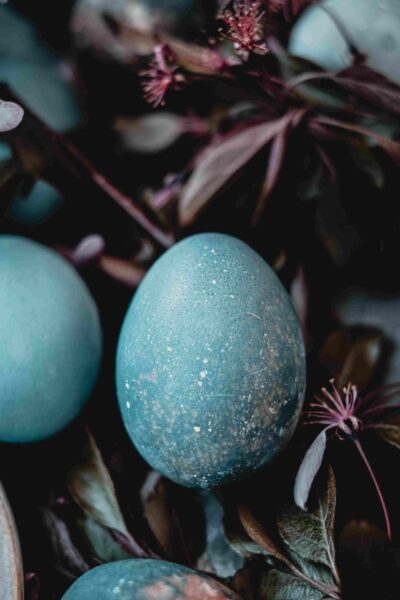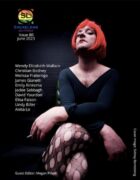CW: child death/abandonment, genocide
The baby cries against my chest, writhing and rooting, like worms after a storm. She clamps onto my left breast, even when I try to pull her off, the hard O of her mouth sucking for milk that has gone dry. They tell us to keep walking, just keep walking, we’ll be there soon, and my body is as inhospitable as the desert around us. My two older daughters clutch my hands as we walk, and the baby squirms and swells against the shawl pinning her to me. The baby is four months old, but unlike her siblings, she was never really born—there is a fullness in me that hasn’t gone down, a ripe melon pressing against the inner wall of my abdomen, and even as my baby weeps against my sun-blistered skin, she’s inside me too, growing.
The day the baby was born, her oldest sister—Aghavni, the one clinging to my right hand—found a birds’ nest in the tree that used to be our tree, in front of the house that used to be our house. She reached up into the nest and plucked out an egg—a perfect blue oval. She held it up to show me, but then her brother stole the ribbon straight out of her hair, and Aghavni yelled, threw the egg at him, without thinking—oh no she gasped, hands clasped over her mouth, and I should’ve scolded her, how would you feel if somebody snatched you out of your home and broke you, but she felt guilty enough already, and the egg was shattered, oozing yolk like honey from a honeycomb, like blood from an open wound—and then the labor pains started and I didn’t think about the broken bits of shell until the next day, when the mother bird returned to her nest, tending the two remaining eggs, singing and fussing as she always did.
I don’t remember my baby’s birth, because of all that happened after. I remember she was pink, like cured lamb. I remember how light she felt when I scooped her up, nothing more than a bundle of feathers, tiny compared to my other two daughters. But now my arms ache, my bones scrape, I cannot feed her, can’t carry her another step.
Along our route, mothers have done the unthinkable. Discarded babies mark our path, like writhing, flesh-colored stones.
I could never, I told myself at first, sickened, how can they possibly, what kind of mother could? But now I understand what kind of mother—the kind with a sandpaper tongue and an overripe melon threatening to split open her insides, the kind with other children who are also starving, the kind of mother with no seeds or figs or olives to drop into the beaks of her young, only salt and fear and hard pebbles, and overhead the vultures, the crows, an occasional crane—those beautiful gray ones, with blood-red eyes and white tears swept back from their faces. God forgive me.
I choose a tree with a puddle of shade pooled up underneath. I do it quickly, and keep walking.
Mama, Aghavni whispers, her voice like dry grass, but I pull her and her sister along, not looking back, my chest lighter and also heavier, and I can feel the film of sweat my baby has left on the front of my dress, an imprint in the shape of her body, I can feel the ghosts of her hands and feet pressing into my flesh. We walk and walk and walk and walk, until I know that if I look back, I won’t see her—she will have vanished around a bend in the endless, many-legged snake of us, and still I can’t bear to check, can’t risk looking and not seeing.
When my baby was two months old, before all of this started, I wanted her to taste some of the sweetness her siblings had tasted. Just in case. I put a few slices of ripe persimmon in a cloth bag and let her gnaw on it, sticky sunshine oozing out, and her eyes widened, and she laughed. Her first laugh. I don’t think I imagined it. She had beautiful eyes. The most perfect fingernails.
Mama, one of my girls repeats, but I look down at them, and they haven’t spoken, neither one of them, their lips hardened like beaks, and then I feel her. My baby, tugging from deep in my abdomen, as though we’re still tethered, the cord stretching—and all at once it hits me, the futility of what I’ve done. We have left her. We will die anyway. And I tear out of line, dragging my girls with me, and we begin to run, so parched that our tears are only salt, like we used to cure meats for the winter, like the dash I sprinkled into cakes and halva to draw out the richness, and I’m looking under every tree but they all look different than before, this one too barren, the next one too wide. I’m searching for my baby under twigs and tents and overripe bodies, I’m asking other mothers if they have seen her, I am shouting her name as though she can speak and could answer, her laughter pealing out like bells, like trumpets, and I don’t notice it happening at first, but my girls’ nails dig into my wrists, like claws into bark—their fingerbones knit into mine, our flesh melding, skin erupting with feathers, and suddenly we’re lifting off, the desert releasing us, each daughter a wing flapping, my body pointed between them like an arrow, and from these great heights, we see her—a smooth blue egg with wheat-colored speckles, tucked beneath the tree where I left her—and I swoop down and scoop her into my talons, an unhatched jewel, and soon we’re gliding away from it all, the sun a ripe persimmon, the flow of death a river below us, rust colored, already shrinking.



 The core workshop of SmokeLong Fitness is all in writing, so you can take part from anywhere at anytime. We are excited about creating a supportive, consistent and structured environment for flash writers to work on their craft in a community. We are thrilled and proud to say that our workshop participants have won, placed, or been listed in every major flash competition. Community works.
The core workshop of SmokeLong Fitness is all in writing, so you can take part from anywhere at anytime. We are excited about creating a supportive, consistent and structured environment for flash writers to work on their craft in a community. We are thrilled and proud to say that our workshop participants have won, placed, or been listed in every major flash competition. Community works.